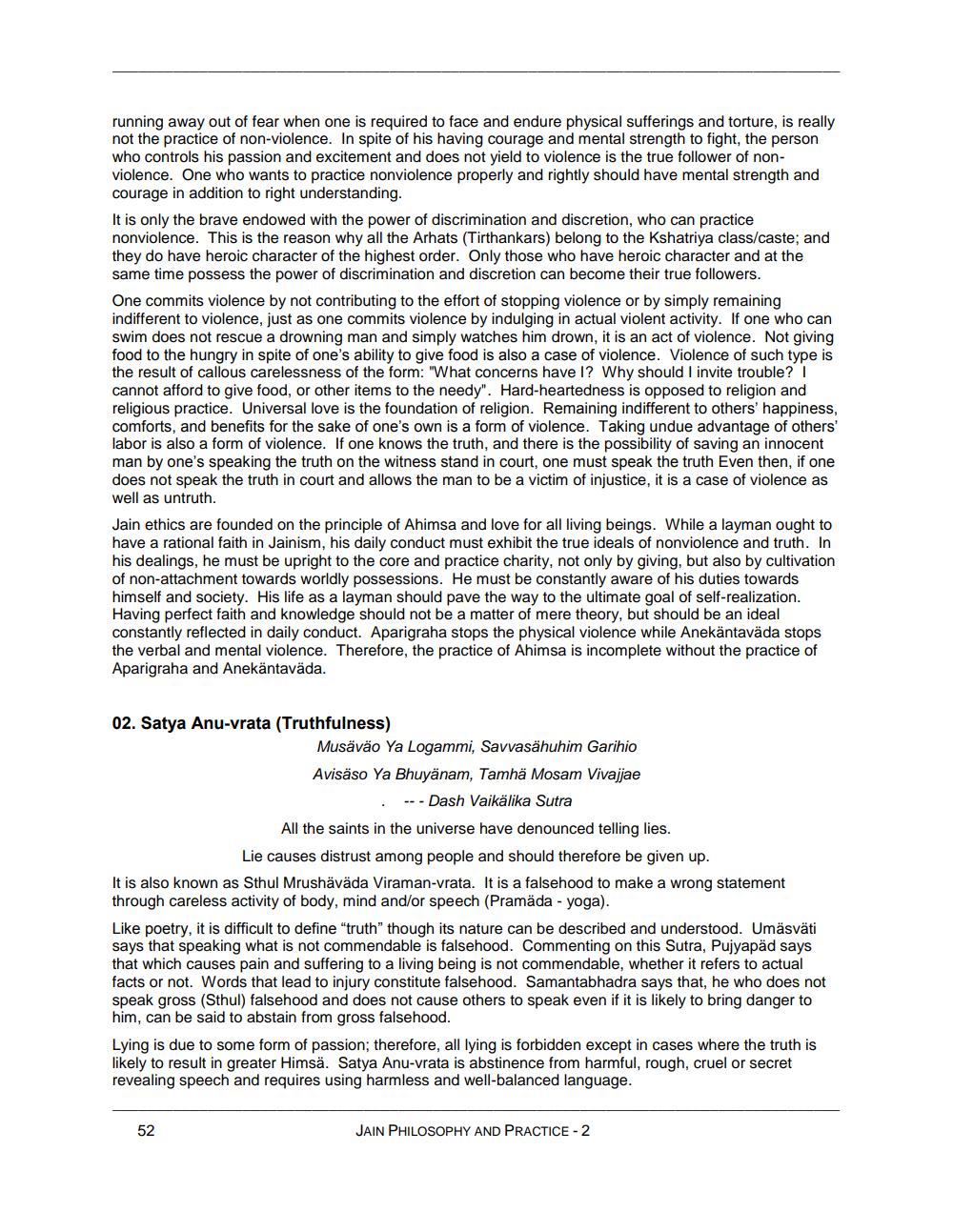________________
running away out of fear when one is required to face and endure physical sufferings and torture, is really not the practice of non-violence. In spite of his having courage and mental strength to fight, the person who controls his passion and excitement and does not yield to violence is the true follower of nonviolence. One who wants to practice nonviolence properly and rightly should have mental strength and courage in addition to right understanding. It is only the brave endowed with the power of discrimination and discretion, who can practice nonviolence. This is the reason why all the Arhats (Tirthankars) belong to the Kshatriya class/caste; and they do have heroic character of the highest order. Only those who have heroic character and at the same time possess the power of discrimination and discretion can become their true followers. One commits violence by not contributing to the effort of stopping violence or by simply remaining indifferent to violence, just as one commits violence by indulging in actual violent activity. If one who can swim does not rescue a drowning man and simply watches him drown, it is an act of violence. Not giving food to the hungry in spite of one's ability to give food is also a case of violence. Violence of such type is the result of callous carelessness of the form: "What concerns have I? Why should I invite trouble? cannot afford to give food, or other items to the needy". Hard-heartedness is opposed to religion and religious practice. Universal love is the foundation of religion. Remaining indifferent to others' happiness, comforts, and benefits for the sake of one's own is a form of violence. Taking undue advantage of others' labor is also a form of violence. If one knows the truth, and there is the possibility of saving an innocent man by one's speaking the truth on the witness stand in court, one must speak the truth Even then, if one does not speak the truth in court and allows the man to be a victim of injustice, it is a case of violence as well as untruth.
Jain ethics are founded on the principle of Ahimsa and love for all living beings. While a layman ought to have a rational faith in Jainism, his daily conduct must exhibit the true ideals of nonviolence and truth. In his dealings, he must be upright to the core and practice charity, not only by giving, but also by cultivation of non-attachment towards worldly possessions. He must be constantly aware of his duties towards himself and society. His life as a layman should pave the way to the ultimate goal of self-realization. Having perfect faith and knowledge should not be a matter of mere theory, but should be an ideal constantly reflected in daily conduct. Aparigraha stops the physical violence while Anekäntaväda stops the verbal and mental violence. Therefore, the practice of Ahimsa is incomplete without the practice of Aparigraha and Anekantaväda.
02. Satya Anu-vrata (Truthfulness)
Musäväo Ya Logammi, Savvasähuhim Garinio Avisäso Ya Bhuyänam, Tamhä Mosam Vivajjae
--- Dash Vaikälika Sutra All the saints in the universe have denounced telling lies.
Lie causes distrust among people and should therefore be given up. It is also known as Sthul Mrushäväda Viraman-vrata. It is a falsehood to make a wrong statement through careless activity of body, mind and/or speech (Pramäda - yoga). Like poetry, it is difficult to define "truth" though its nature can be described and understood. Umäsväti says that speaking what is not commendable is falsehood. Commenting on this Sutra, Pujyapäd says that which causes pain and suffering to a living being is not commendable, whether it refers to actual facts or not. Words that lead to injury constitute falsehood. Samantabhadra says that, he who does not speak gross (Sthul) falsehood and does not cause others to speak even if it is likely to bring danger to him, can be said to abstain from gross falsehood. Lying is due to some form of passion; therefore, all lying is forbidden except in cases where the truth is likely to result in greater Himsä. Satya Anu-vrata is abstinence from harmful, rough, cruel or secret revealing speech and requires using harmless and well-balanced language.
52
JAIN PHILOSOPHY AND PRACTICE -2




